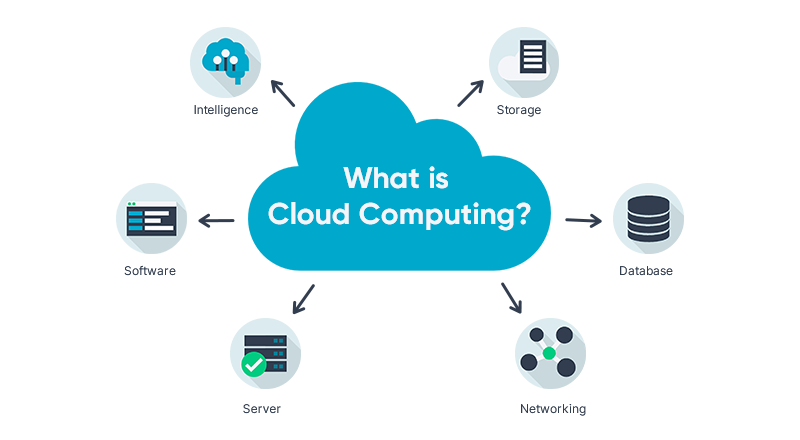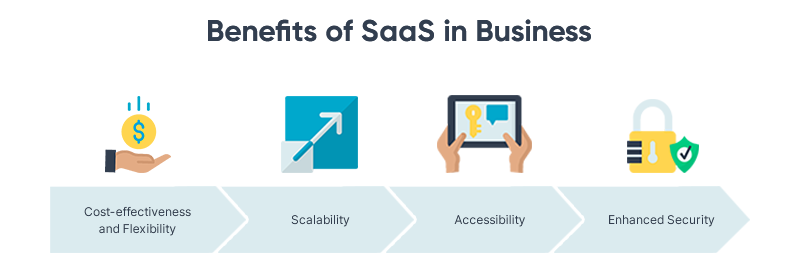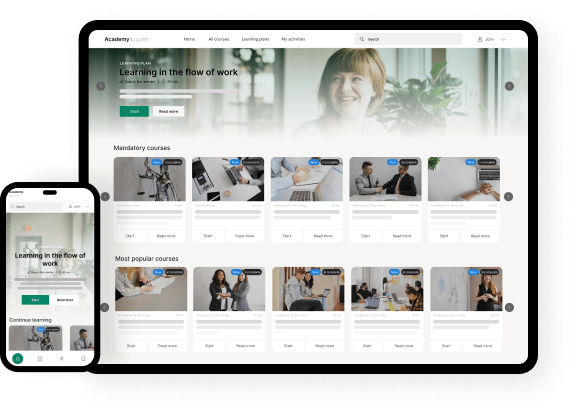If you’re using either Netflix, Shopify, or Microsoft Outlook, you’re using a type of SaaS or Software as a Service. However, the previous examples are services for personal use only. When applied in larger contexts such as in businesses, SaaS applications become more complex, yet beneficial.
SaaS applications are foundational for specific business needs such as managing customer relationships, optimizing employee engagement, or creating compelling marketing content.
But what exactly is SaaS?
Software as a Service or SaaS
Software as a Service or SaaS is a model of delivering software and applications to users over the internet. SaaS provides a complete software solution that eliminates the need for painful and time-consuming installation because everything is run through the internet. The application or software is accessible to any device with a network connection and can be available in different web browsers.
This cloud-based software distribution model involves an independent software vendor or ISV that hosts and maintains the servers, database, and other elements that make up the software.
How does SaaS work?
Purchasing SaaS solutions work on a pay-as-you-go basis. It’s like renting the software for business or organizational applications. As mentioned earlier, the software provider takes care of all underlying software infrastructure maintenance and data management. An appropriate service agreement between the vendor and the user ensures the availability of the app and the security of the data that will be provided. In other words, businesses simply pay a subscription fee to have access to the software.
SaaS, IaaS, and Paas: How do they differ from one another?
SaaS is just one of the three types of cloud computing services, the other two are Infrastructure as a Service (IaaS), and Platform as a Service (PaaS). While each type serves a different purpose, they build on top of one another – that’s why they are often called a computing “stack.” But for the sake of knowing which type of cloud computing will suit your specific needs as a business, let’s talk about their unique functions.
What is Cloud Computing?
Cloud computing is the delivery of computing services that includes servers, storage, databases, networking, software, and intelligence over the internet or the “cloud”. It allows businesses to have flexible IT resources that help lower operating costs, upgrade to the latest version of IT infrastructures, and scale their operations when needed.

Infrastructure as a Service (IaaS)
Iaas is the most basic category of cloud computing services. It serves as your instant computing infrastructure—servers and virtual machines (VMS), storage, network, and operating systems.
Paying for this type of service helps you avoid hefty expenses spent on buying and managing your own physical servers and other data center infrastructure. Businesses use Infrastructure as a Service in the following scenarios:
- Test and development
- Website hosting
- Storage, backup, and recovery
- Web apps
- High-performance computing
- Big data analysis
Platform as a service (PaaS)
On the other hand, PaaS provides developers a framework that they can build upon and create various software applications. Think of PaaS as an “on-demand environment” for developing, testing, and managing mobile apps. It gives developers access to all available resources to deliver cloud-based apps to cloud-enabled enterprise applications. As with SaaS and IaaS, managing servers, storage and databases will be the sole responsibility of the cloud service provider.
PaaS gives businesses the opportunity to design and create applications or middleware that is scalable and highly available. Platform as a Service can have a number of advantages. Commonly, PaaS is best when used for:
- App development
- Analytics or business intelligence
- Other services that enhance applications such as workflow, directory, and security.
Key Takeaways
SaaS: cloud-based software distribution model that’s offered by independent software vendors.
IaaS: an instant computing infrastructure—servers and virtual machines (VMS), storage, network, and operating systems.
PaaS: a platform or an “on-demand environment” for developing, testing, and managing mobile apps.
Benefits of SaaS in business
One of the major advantages of a SaaS business model is that it serves as an alternative to conventional software installation. This traditional model often necessitates building your in-house server and configuring important applications. In a typical multi-tenant SaaS application, the cloud service provider does all the necessary maintenance for you including updates and bug fixes. The good thing about this is that everything is being rented; you only pay for the software for a specific purpose and period of time.
This is perfect for small businesses that wish to upscale without having the need to spend tons of money on onerous IT solutions. With that being said, here are other benefits of using SaaS in your business:
Cost-effectiveness and flexibility
Businesses can benefit from the cost-effectiveness of using SaaS. Rather than purchasing software for installation, or extra hardware support, companies can enjoy a monthly or yearly SaaS subscription, which they can terminate as soon their contract ends.
Scalability
SaaS offers high vertical scalability or the ability to increase the capacity of existing hardware or software by adding resources. Since SaaS solutions reside in cloud environments, they are easy to scale and integrate with other SaaS applications.
Accessibility
SaaS customers only need an internet-enabled device to log into a software. Users can access the software in any location given its web-based capabilities. Easier accessibility makes everything run more smoothly.
Enhanced security
One of the pressing issues in digital solutions is privacy and security. However, SaaS solutions, in most situations, maintain the safety of your company’s information. Cybersecurity risks related to SaaS can be different from the risks associated with traditional software. Data is more at risk in-house where there’s less attention to enhancing data security management. On the other hand, SaaS providers use highly secure and sophisticated cloud infrastructures that are monitored and controlled round the clock.

Empower your business with our SaaS solution
It’s hard to imagine that in an ever-dynamic global market, some companies continue to overlook innovation. The SaaS industry is growing. In fact, businesses expect it to be worth $63.6 billion dollars by 2023. This means that companies are realizing the value of having a SaaS solution that enables them to upscale their operations with minimum costs and downtime.
We at Cursum believe that every company should have the opportunity to turn their ideas into a working digital product. That’s why we offer a top-notch SaaS solution that enables businesses to modernize their business approach. Whether it be a solution for your company’s onboarding, compliance, or people development, we can support your campaign.


